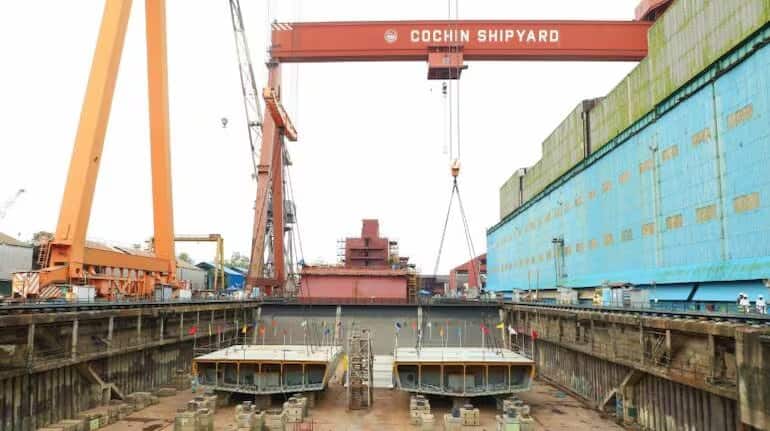Cochin Shipyard Limited (COCHINSHIP) (Cochin Shipyard Share) has been making waves in the Indian stock market. With a staggering year-on-year growth of over 347% and a nearly 100% increase in the last six months, it’s no surprise investors are setting their sights on this maritime giant. But before you jump on board, let’s navigate the key aspects of Cochin Shipyard’s share and see if it’s the right voyage for you.
Table of content
Riding the Wave: Reasons for Cochin Shipyard’s Surge
Several factors are contributing to Cochin Shipyard’s impressive rise:
- Defense Boom: India’s focus on bolstering its naval defense has led to a surge in shipbuilding contracts awarded to Cochin Shipyard. Their expertise in constructing warships positions them perfectly to capitalize on this trend.
- Increased Government Spending on Infrastructure: The Indian government’s push for infrastructure development creates a demand for commercial vessels. Cochin Shipyard’s ability to handle diverse shipbuilding projects keeps them in the game.
- Strategic Location: Situated along India’s southwest coast, Cochin Shipyard boasts a well-equipped harbor and a skilled workforce, making it a prime location for shipbuilding activities.
Beyond the Horizon: Potential Challenges
While the future looks bright, it’s not all smooth sailing for Cochin Shipyard:
- Competition: The Indian shipbuilding industry is witnessing increased competition from foreign players. Maintaining its edge in technology and efficiency will be crucial for Cochin Shipyard.
- Global Economic Fluctuations: A slowdown in the global economy could impact demand for new ships, affecting Cochin Shipyard’s order book.
Let’s delve into some key metrics to understand Cochin Shipyard’s share better:
- Market Capitalization: As of today (April 4, 2024), Cochin Shipyard boasts a market cap of over ₹27,000 Crore, indicating a substantial investor base.
- Price-to-Earnings Ratio (P/E Ratio): This ratio, which compares a company’s share price to its earnings, is currently on the higher side. While it suggests growth potential, it also indicates a premium attached to the share.
Financial Performance:
It’s important to analyze Cochin Shipyard’s financial reports to gain a deeper understanding of their health. Here are some aspects to consider:
- Revenue Growth: While past performance shows limited revenue growth, future contracts in the defense sector could significantly impact this metric.
- Profitability: Analyzing the company’s profit margins and net income will reveal its financial health and ability to generate sustainable returns.
Making the Investment Decision
Investing in Cochin Shipyard requires careful consideration. Here are some questions to ponder before setting sail:
- Risk Tolerance: The recent surge indicates some volatility. Are you comfortable with a potentially high-risk, high-reward investment?
- Investment Horizon: Cochin shipyard’s growth might be driven by long-term government projects. Does your investment horizon align with this long-term vision?
- Portfolio Diversification: Adding Cochin Shipyard to a diversified portfolio can mitigate risk.
Conclusion: Charting Your Course
Cochin Shipyard presents an exciting opportunity for investors seeking exposure to the growing Indian shipbuilding industry. However, a thorough analysis of the company’s financials, prospects, and risk tolerance is essential before making an investment decision. Remember, successful investing is like navigating a voyage – careful planning and a keen eye on the horizon are key to reaching your destination.
Bonus Tip: Conduct your research by reading financial news articles and analyst reports on Cochin Shipyard. This will provide valuable insights to supplement the information presented here.
By following these steps, you can decide whether Cochin Shipyard deserves a place in your investment portfolio. Remember, this blog post is for informational purposes only and should not be considered financial advice. Always consult with a qualified financial advisor before making any investment decisions.
For More click Here.
